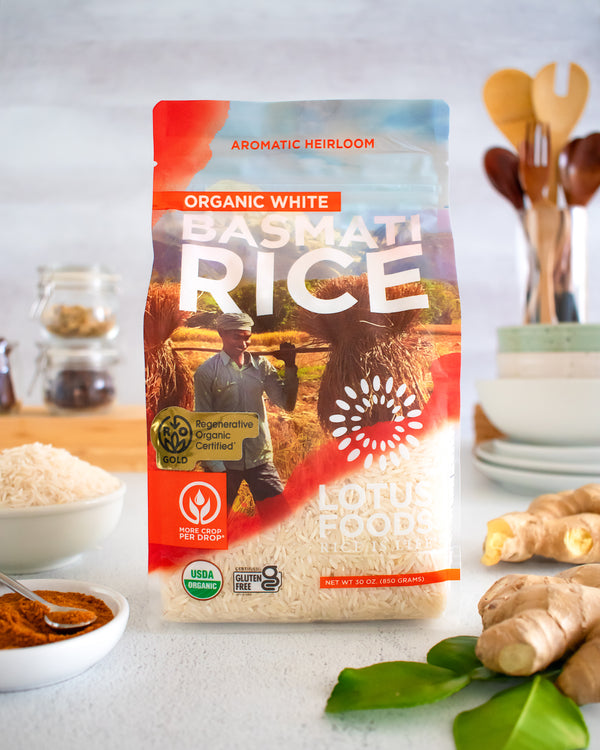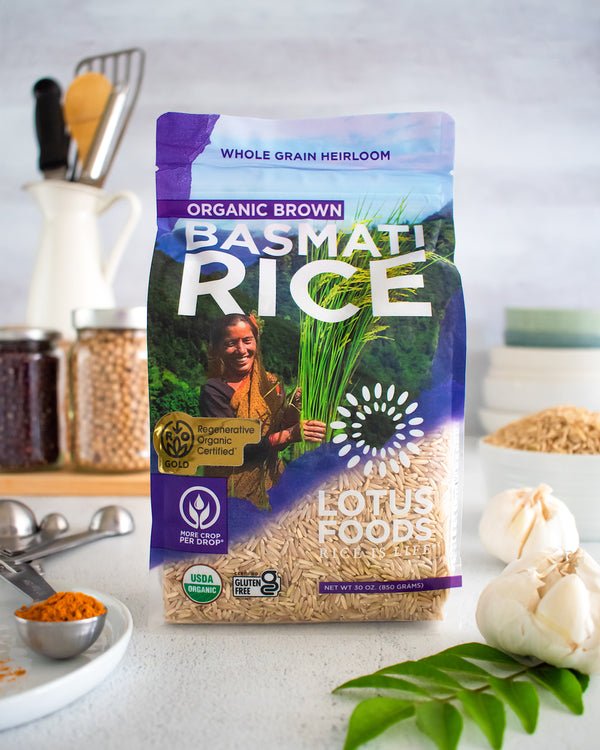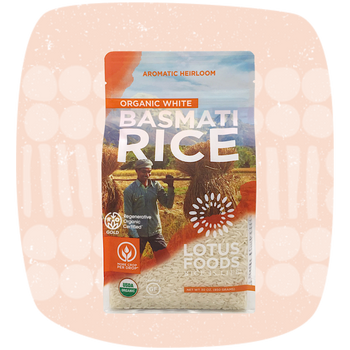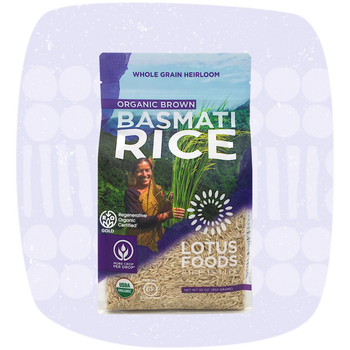The Mother of All Basmati
December 11, 2020
So let’s talk about basmati rice. It’s probably one type of rice along with jasmine that you and many other American consumers can identify. You know, generally, that basmati rice is served with Indian food and jasmine rice is served with Asian cuisine. But both basmati and jasmine are not just one rice variety. Rather they encompass a diversity of genetically related rice varietals. So, while all rice labeled as basmati shares certain defining characteristics, it is not the very same variety.
Basmati rice is a unique aromatic long grain rice. It has extra long, slender grains that elongate at least twice their original size during cooking, and it is prized for its aroma, fluffy texture, and superior taste. Aside from basmati’s unique cooking qualities, it’s reported to have a low glycemic index.
Basmati rice evolved in the foothills of the Himalayas in what is today Pakistan and northwestern India. The word “basmati” is derived from two Sanskrit words, vaas (fragrance) and matup (possessing). In north India, “va” is pronounced as “ba,” and thus Vaasmati became Basmati.
The basmati rice sourced by Lotus Foods is called Dehraduni.

Although basmati rice had been grown for centuries by farmers in India and Pakistan, a controversy erupted in the late 1990s when the US-based company RiceTec tried to patent basmati rice. The Indian government successfully challenged the patent, and subsequently created a Geographical Indication for basmati rice to protect its heritage and recognize that the special quality of basmati rice is attributed to the unique combination of soil, water, climate and cultural practices under which it is grown, in addition to the inherent genetic features.
In India today, just 29 varieties produced in a handful of northern states are recognized as basmati rice, even though basmati derivatives are cultivated throughout the world. This is analogous to Scotch whiskey, which must be made in Scotland; and only sparkling wine produced in the Champagne region of France can be called “champagne.”
Among these basmati rices are varieties that have been cultivated continuously for generations and even centuries by farmers without interference by scientists. And there are basmati varieties that are genetically related but have been “improved” by scientists to be mostly higher yielding or more disease resistant by breeding in traits from non-basmati rice.
Our Basmati Rice is the first Regenerative Organic Certified® (ROC™ Gold) Rice. This rigorous new standard promotes farming that enriches rather than degrades soil and values animals and workers.

The basmati rice sourced by Lotus Foods is called Dehraduni, which is as close as you can get to the “ur”-basmati. Some experts think that basmati rice actually originated in the Dehradun region of India’s Uttarakhand state and later began to be cultivated in other parts of undivided India during the British regime. However, with the advent of modern breeding and hybrids, traditional basmati varieties like Dehraduni have been losing out to new high-yielding rice varieties accompanied by agrochemical inputs. Rapid urbanization and loss of farmlands have further accelerated the erosion. Traditional basmati varieties also have some disadvantages in that they tend to be slow maturing, tall, prone to lodging, and not very high-yielding.
The World’s First Regenerative Organic Certified® Gold Rice
Lotus Foods began to source organic Dehraduni basmati from farmers in Uttarakhand in 2016, with the express purpose of providing incentives that would encourage farmers to continue cultivating this exceptional traditional basmati rice. Currently, we source our Dehraduni basmati rice from organic farmers. PraTithi Organic Foods, in Uttar Pradesh state. These farmers practice System of Rice Intensification (SRI)/More Crop Per Drop® growing methods and have found that under this management Dehraduni rice actually produces prolifically and does not lodge, due to more extensive root systems. In 2019, they participated in a pilot program implementing the standards for Regenerative Organic Certification. This new certification imposes the highest standards in the industry for soil health. Social fairness and animal welfare are the two other key pillars. Our farmers qualified at the Silver Level (Bronze, Silver, Gold) out of the gate. Look for the Regenerative Organic Certified® (ROC™) label on Lotus Foods’ 30oz bags of Brown & White Basmati Rice.

One of the few authentic traditional basmati varieties still in production, our whole grain heirloom basmati is grown on family farms in Northern India.
Resources
PraTithi Founder and CEO, Tapan Ray
Cornell University | System of Rice Intensification
Women's Essential Role in Rice
The World's First ROC™ Gold Rice




